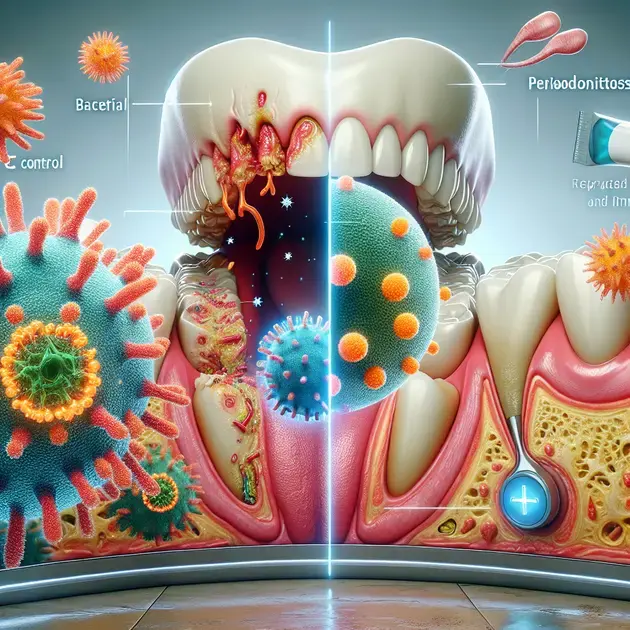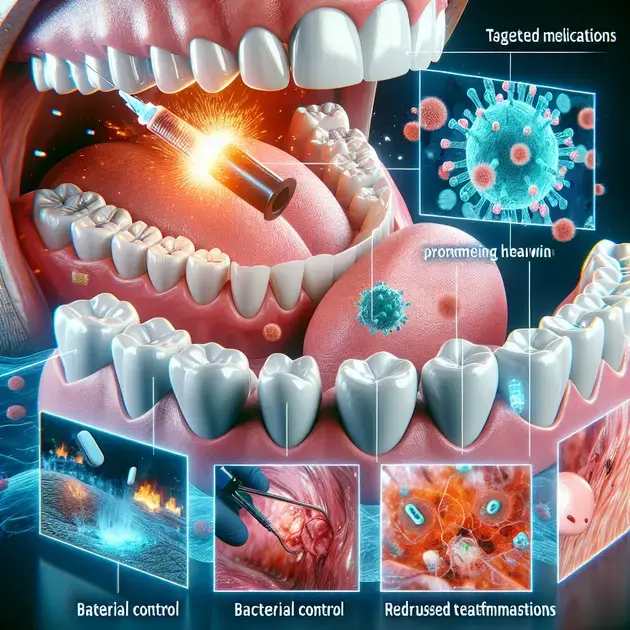Periodontitis, a severe gum infection, can lead to tooth loss if not properly managed. In this article, we will delve into the importance of medication in managing periodontitis and preventing further oral health complications.
Recent studies have shown that using the right medication can significantly reduce the progression of periodontitis and improve overall oral health outcomes. Understanding the role of medication in treating periodontal disease is crucial for maintaining a healthy smile.

The Role of Medication in Periodontitis Management
Medication plays a crucial role in the management of periodontitis, a serious gum infection that can damage the soft tissue and destroy the bone that supports your teeth. Proper medication prescribed by your dentist or periodontist can help control the infection and prevent further complications. Here is a step-by-step guide on how to effectively manage periodontitis with medication:
1. Consultation with a Dental Professional
The first step in utilizing medication for periodontitis management is to schedule a consultation with a dental professional. Your dentist will assess the severity of your gum disease and recommend the appropriate medication based on your condition.
2. Prescription of Antibiotics
In cases of advanced periodontitis, antibiotics may be prescribed to control the bacterial infection. These antibiotics help eliminate the harmful bacteria in the pockets around your teeth and gums, aiding in the reduction of inflammation and prevention of further damage.
3. Antimicrobial Mouthwash
Alongside antibiotics, your dentist may recommend an antimicrobial mouthwash to reduce plaque buildup and combat bacteria in your mouth. Regular use of the prescribed mouthwash can help maintain good oral hygiene and support the healing process.
4. Follow-Up Appointments
It is essential to attend follow-up appointments with your dental provider to monitor the progress of your treatment. During these appointments, adjustments to your medication or treatment plan may be made based on your response to the medication.
5. Ongoing Maintenance
After the active treatment phase, maintaining good oral hygiene practices, such as regular brushing, flossing, and using prescribed medication, is crucial to prevent the recurrence of periodontitis. Compliance with your medication regimen and follow-up visits will help in effectively managing the condition.
Benefits of Using the Right Medication
Using the right medication for periodontitis management offers several benefits that contribute to the overall improvement of your oral health. Here are some advantages of utilizing appropriate medication:
1. Controlled Infection
Proper medication can effectively control the bacterial infection responsible for periodontitis, preventing it from spreading and causing further damage to your gums and teeth.
2. Reduced Inflammation
The right medication can help reduce inflammation in the gum tissue, alleviating discomfort and promoting healing. By targeting the source of inflammation, medication aids in the restoration of oral health.
3. Preservation of Teeth
By managing periodontitis with the appropriate medication, you can preserve the stability of your teeth and prevent the need for extensive dental procedures such as extractions or implants. This contributes to maintaining your natural smile.
4. Improved Overall Health
Effective medication management of periodontitis not only benefits your oral health but also has positive impacts on your overall well-being. Controlling gum disease can reduce the risk of systemic health issues linked to untreated periodontitis.
5. Enhanced Quality of Life
With the right medication, you can experience an improved quality of life through better oral health and reduced oral health complications. Managing periodontitis effectively can boost your confidence and comfort in daily activities.
Key Factors in Preventing Oral Health Complications
Preventing oral health complications, including periodontitis, requires attention to key factors that play a significant role in maintaining a healthy mouth. By focusing on these factors and incorporating them into your oral care routine, you can reduce the risk of developing severe dental issues. Here are essential steps to prevent oral health complications:
1. Regular Dental Check-Ups
Scheduling routine dental check-ups with your dentist allows for early detection of potential oral health problems, including gum disease. During these visits, your dentist can provide guidance on proper oral hygiene and recommend preventive measures to maintain your oral health.
2. Consistent Oral Hygiene Practices
Brushing your teeth twice a day, flossing daily, and using antimicrobial mouthwash can help remove plaque and prevent the buildup of harmful bacteria in your mouth. Consistent oral hygiene practices are crucial in preventing gum disease and other oral health complications.
3. Healthy Diet and Lifestyle Choices
Eating a balanced diet rich in nutrients, limiting sugary foods and beverages, and avoiding tobacco products contribute to overall oral health. Making healthy lifestyle choices can reduce the risk of gum disease and maintain the well-being of your teeth and gums.
4. Stress Management
Excessive stress can impact your oral health, leading to teeth grinding, jaw clenching, and ultimately, gum disease. Engaging in stress-reducing activities such as exercise, meditation, or counseling can help prevent oral health complications associated with stress.
5. Education and Awareness
Being informed about proper oral care techniques, the signs of gum disease, and the importance of preventive measures is essential in preventing oral health complications. Educate yourself on oral health practices and stay aware of changes in your oral cavity to address issues promptly.

**Benefits of Targeted Medications in Periodontitis Management**
Introduction
Periodontitis is a common and serious gum infection that damages the soft tissue and destroys the bone that supports the teeth. With the advancement of dentistry, targeted medications have emerged as effective tools in managing periodontitis. These medications are specifically designed to target the bacteria causing the infection, reducing inflammation, and promoting healing in the gums.
Effective Bacterial Control
One of the key benefits of targeted medications in periodontitis management is the effective control of the bacteria responsible for the infection. These medications can reach deep into the pockets of the gums where traditional cleaning methods may not be as effective, targeting and eliminating the harmful bacteria.
Reduced Inflammation
Inflammation is a common symptom of periodontitis, leading to red, swollen, and bleeding gums. Targeted medications contain anti-inflammatory agents that can help reduce the inflammation in the gums, providing relief to the patient and creating a more favorable environment for healing.
Promotes Healing
By targeting the root cause of periodontitis, targeted medications help promote healing in the gums. These medications can aid in the regeneration of the damaged tissues and bone, restoring the health of the gums and preventing further progression of the infection.
Improved Treatment Outcomes
Overall, the use of targeted medications in periodontitis management can lead to improved treatment outcomes. By effectively controlling bacteria, reducing inflammation, and promoting healing, these medications play a crucial role in enhancing the success of periodontal treatment and maintaining the long-term health of the gums and teeth.
Conclusion
In conclusion, targeted medications offer a promising approach in the management of periodontitis, providing a range of benefits that can significantly impact treatment outcomes. By effectively targeting the bacteria responsible for the infection, these medications ensure thorough bacterial control even in hard-to-reach areas within the gums.
Furthermore, the inclusion of anti-inflammatory components in targeted medications aids in reducing the inflammation associated with periodontitis, offering relief to patients and creating a conducive environment for healing to take place. This dual action of bacterial control and inflammation reduction plays a crucial role in the overall promotion of healing and regeneration of damaged gum tissues and bone.
Overall, the integration of targeted medications in periodontitis management not only improves treatment outcomes but also contributes to the long-term health of gums and teeth. By addressing the root cause of the infection and facilitating healing processes, these medications stand as key players in elevating the success rates of periodontal treatment, emphasizing the importance of targeted approaches in enhancing oral health.



